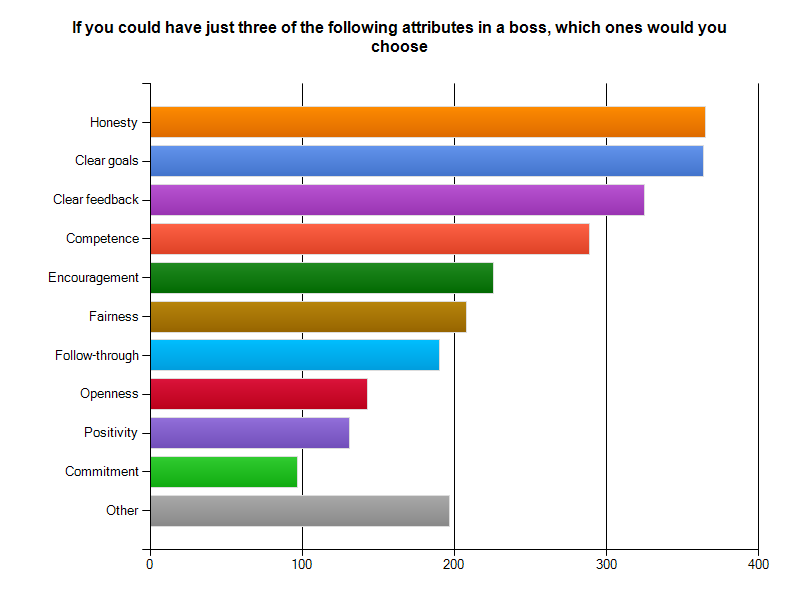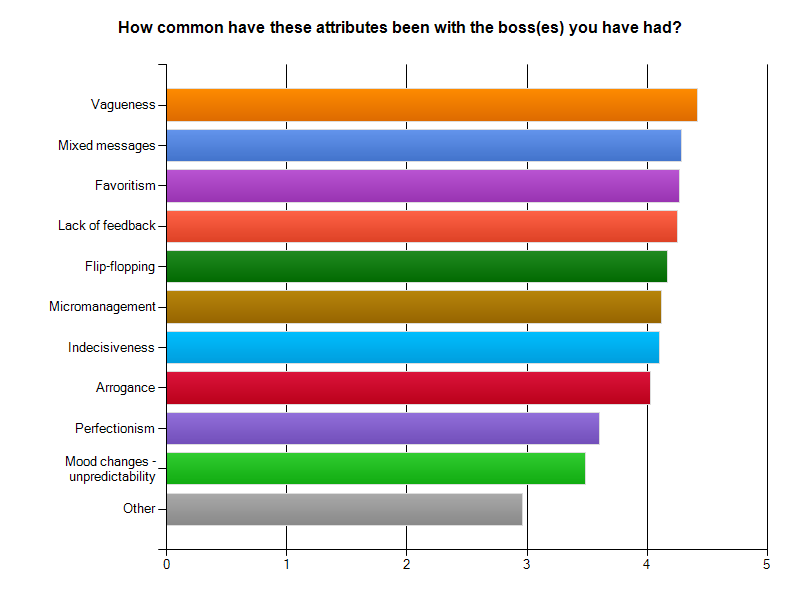Podcast: Play in new window | Download
Friends,
Thanks to the 800+ of you who responded to last week’s survey, we’ve got a crystal clear picture of what people want in a boss . . . and what’s often missing. Here’s the bummer: What we most want is what’s most often missing: CLARITY! So, this morning’s invitation to everyday leaders is to double back and clarify.
For those who didn’t take the survey or check out the full results, here’s the top takeaway: When asked to select from a list, what three attributes were most important in a boss, people said as follows: Honesty 43.2%; Clear goals 43.1%; and Clear feedback 38.5%. People want their boss to be straightforward in saying where they’re going, and to tell them clearly how they’re performing along the way. Here are the survey’s top answers:
What is remarkable is that when I offered people a host of negative boss behaviors, and asked which ones were most frequent, 4 of the top 5 had to do with these same attributes of honesty and clarity. Topping the list were: vagueness, mixed messages, favoritism, lack of feedback and flip-flopping. Here are the top vote-getters:
The message could not be clearer for all of us. Clarify the goals, the ends, the aims – what it is we’re trying to accomplish, and frequently and clearly let people know how they are doing against those objectives. Do it to:
Lead with your best self,
Dan



It’s so simple yet so difficult! The irony of it is that clarity puts one in a vulnerable position – there’s nothing and nowhere to hide. Yet in our culture, it’s a sign of weakness to be vulnerable. What’s up with that?
As usual Dan, you have nailed the issue on the head. Thank you!
Which is exactly why any lasting leadership has to model and encourage this kind of vulnerability.
As leaders of organiztions, families, worship communities, and communities in general we need to model a healthy vulnerability. We need to praise those who in good faith put themselves in vulnerable positions in pursuit of mission, vision and excellence, and alignment with healthy core values.
We need to reward honesty, integrity, clarity and compassion above (or even as the foundation for) tenure, productivity, ambition, etc.
Richard and Kevin,
That’s an insightful connection between honesty and vulnerability; as you say Kevin, “nothing and nowhere to hide.”
D.
Hey Dan,
As Alice and I move from being employees to being management, your timing on this issue couldn’t be any more perfect. I’ve always said, “I want to be the manager that I would like to have (and rarely did)” Now I know that most other people would like the same thing. We are not going to hire anyone right away, but when we do, it’s good to know that my style of honesty and directness (which I see as a form of clarity) can be successful.
Kath
Kath,
With the way I watch you raising those six (seven?) kids, I think you could do anything!
Dan
I didn’t take the survey because I’m retired and don’t think my input would be as relevant as that from employed folks. However, I felt the need to make a comment on your results posting.
One of your sentences stood out to me: “People want their boss to be straightforward in saying where they’re going, and to tell them clearly how they’re performing along the way.”
I would suggest adding that, as well as “where they’re going”, employees would also like to know “why” they are going that way. What is the reason for the mission? If employees were involved in developing the “mission” then they would know why that is the mission. But, often employees are only told what the mission is without knowing why or how that became the mission.
Dan –
This is a great addition to the discussion. In Kouzes and Posner’s great work The Leadership Challenge, they find 4 characteristics always stick out:
honesty
forward-looking
competent
has a vision
You are really pointing to the importance of a vision that makes sense to people, a vision in which they want to participate and understand the Why. Great advice!
Dan
I think if a person is honest then many positive attributes that characterize a good leader flow from that trait. If a person is honest in their interaction with the persons they lead or manage it suggests to me they are free of any insecurities and don’t feel threatend in their role as a leader which enhances their self confidence in decision making and the fair application of policies to everyone. Leaders will not make every decision correctly but if the leader has established a solid foundation of trust with the group he or she supervises or leads then the respect the group has developed for the leader will act as a life jacket to keep the entity afloat to achieve its goals, vision, and values.
Jim,
I think honesty is hugely important. It tops my survey, as it has topped Kouzes and Posner’s million surveys across cultures and across two decades.
But it’s clearly not enough. Clear goals and clear feedback build on top of that honesty, and they require something(s) different than honesty; they require a proactivity and a courage that are essential.
But honesty’s the core!
D.